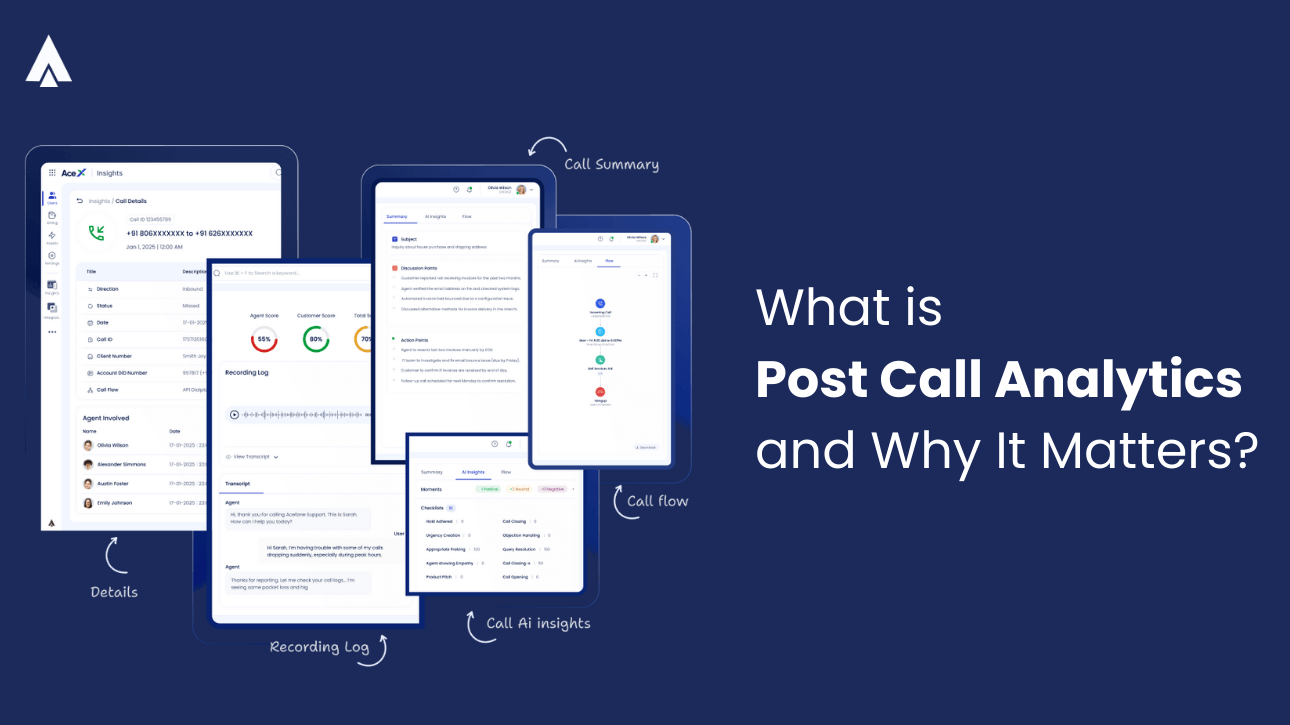Cloud telephony has been a transformative force in the business world for quite some time, helping companies manage customer interactions seamlessly. Its ability to streamline processes, enhance flexibility, and reduce costs has made it an essential tool for efficient communication over the years.
Yet, as the needs, demands, and preferences of customers change, cloud telephony continues to evolve rapidly, driven by emerging technologies.
Let’s look at a few key technologies that will forge the future of cloud telephony:
Artificial Intelligence (AI)
The importance of Artificial Intelligence in communication cannot be overstated. From offering automated customer support to transcribing calls, AI has improved several aspects of cloud phone system. A recent study predicts that by 2025, 95% of all customer interactions will be handled by AI.
Here are a few popular ways in which AI enhances the efficiency of cloud phone systems:
- Chatbots and virtual assistants: AI-based chatbots and virtual assistants act as the first touchpoint in customer support. They can help you respond to common inquiries such as account balances, order status, or product information in real time. The systems can handle multiple interactions simultaneously, freeing up your agents to focus on complex issues that require empathy, problem-solving, or expert knowledge.
- Call transcription and analysis: AI can also help you transcribe customer interactions, analyze the sentiment of conversations, and identify key topics of discussion. With these valuable insights, you can create plans to improve the conversations and train agents.
- Predictive dialers: Predictive dialers are automated dialing systems designed to increase the efficiency of outbound calling campaigns. These dialers deploy algorithms that intelligently predict agents’ availability and adjust dialing rates in real time. Moreover, agents can access call analytics which they can use to recognize cross-selling and upselling opportunities mid-call.
Unified Communications as a Service (UCaaS)
Over the past few years, Unified Communications as a Service (UCaaS) has emerged as a seminal trend in cloud telephony. According to a recent study, the global unified communications market is expected to grow at an annual rate (CAGR) of 17.4% from 2023 to 2030.
With a UCaaS solution, you get texting, video conferencing, and collaboration capabilities on a unified platform, in addition to VoIP phone calls. The synergy between these channels enhances communication efficiency, streamlines workflows, and enhances productivity.
Let’s understand the advantages of UCaaS solutions in detail:
- Integration of voice, video, messaging, and collaboration tools: Having a single platform for voice calling, texting, video conferencing, and collaboration reduces the time spent switching between different tools. This streamlined approach can help your agents have comprehensive conversations with the customers and increase first call resolution rates.
- Mobility and flexibility: UCaaS solutions empower your team to work from anywhere in the world. With a cloud business phone system that works on any internet-enabled device, agents can connect with the customers whenever required. Moreover, if needed, they can seamlessly switch to video conferencing, messaging, or email. This flexibility enhances productivity and improves work-life balance.
- Scalability and cost-effectiveness: UCaaS solutions can easily adjust to your communication needs as your business grows or shrinks. This means you can add or remove users anytime without breaking the bank or expanding network infrastructure. Other than that, you don’t need any on-premises hardware and complex IT management, so you can enjoy predictable monthly costs and avoid upfront capital expenditures.
Looking to understand what is an outbound call center and how UCaaS can streamline its operations? Explore our solutions today!
Ironclad Security
Protecting customers’ data from cyberattacks is a major challenge. As technology continues to evolve, security remains a top priority, and cloud telephony is no exception. Most UCaaS solution providers recognize the need for robust security, and deploy the following methods for data protection:
- End-to-end encryption: With end-to-end encryption, you can safeguard sensitive data by encrypting it at the source and decrypting it only at the intended recipient’s device. This ensures the confidentiality of calls, messages, and other sensitive communications by rendering data unreadable during transmission and storage.
- Two-factor authentication and access controls: Two-factor authentication adds an extra layer of security by requiring users to provide multiple forms of verification, such as a password and a code sent to their mobile device.
- Compliance with industry regulations: Most modern cloud telephony solutions have data management mechanisms that comply with key guidelines like GDPR and HIPAA.This means businesses handling sensitive customer information, such as healthcare providers, can rely on HIPAA-compliant data collection to maintain confidentiality and regulatory adherence. Adhering to these regulations can help you demonstrate a commitment to data security and privacy, building trust with customers and mitigating legal risks.
Increased Focus on Customer Interaction Analytics
Customer interaction analytics involves collecting, analyzing, and interpreting data from all conversations between your agents and customers.
Nowadays, companies are actively taking steps to create workflows that help simplify interaction analytics. They are adopting tools like Acefone’s Insights, which is a comprehensive dashboard containing detailed call analytics, simplified through graphical representation. With these tools, their aim is to leverage data to take better decisions. According to a study, 80% of business leaders attribute improved decisions to data access.
Hence, even in cloud telephony, analytics is a significant trend.
Most state-of-the-art cloud phone system offer features like call recording, detailed analytics, automated transcription, and call statistics. These functionalities can help you understand calling trends, analyze customer requirements, identify common issues, and monitor agent performance. You can then use the gathered insights to refine customer service strategies, train staff more effectively, and ultimately enhance the overall customer experience.
Integration with CRM/ERP Applications
The integration of CRM/ERP/other business software with hosted VoIP phone system is another essential building block for the future of cloud telephony.
This is because, no matter what your business is, CRM software helps you manage, store, and analyze all your customer data. But without an integrated cloud-based business phone system, all the conversations would happen outside this database making it difficult to track and update the customer profiles post interaction.
Cloud-CRM integration helps you streamline customer communication and data management by automatically logging calls, and messages directly into your system. With integration testing, you can enhance customer service by giving your team instant access to customer histories during calls, enabling more personalized and efficient support.
Ready to Future-Proof Your Communication Ecosystem?
The technological trends mentioned above are all set to transform the future of cloud telephony. You can expect rapid advancements in AI, UCaaS, integration, and security, along with a higher focus on customer interaction analytics. This will result in more intuitive, efficient, and cost-effective communication solutions.
With a tech-forward, comprehensive interaction platform like Acefone, you can leverage these cloud telephony benefits and future-proof your communication system. Whether it is a flexible UCaaS solution, integration with 20+ most popular CRMs/ERPs, or seamless data management, Acefone offers it all.
Want to discuss more about your communication needs? Talk to the experts at Acefone today!
Frequently Asked Questions (FAQs)
Here are a few ways businesses can enhance customer experience with cloud telephony:
- Omnichannel Support: Cloud phone systems can help create a unified platform for seamless customer interactions across channels like email, chat, and social media.
- AI-Powered Customer Interactions: Intelligent virtual assistants can handle routine inquiries, freeing up your agents’ bandwidth for complex issues.
- Data-Driven Service Optimization: Cloud telephony offers detailed call metrics to help you improve efficiency and customer satisfaction.
5G technology has profoundly impacted cloud telephony with its unparalleled speed, low latency, and massive capacity. Here are a few key impact areas:
- Enhanced Call Quality: 5G’s high-speed network ensures crystal-clear voice quality, reduced echo, and minimal call dropouts, delivering superior call experiences for your customers.
- Real-time Applications: The ultra-low latency of 5G enables video conferencing, remote collaboration, and interactive voice response systems to operate seamlessly, enhancing productivity and customer experience.
Here are some key cloud security features:
- Encryption: Most tech-forward providers like Acefone employ advanced encryption technologies to safeguard voice calls, SMS messages, and other communication data, both in transit and at rest.
- Access Control: Granular access controls are implemented to restrict unauthorized access to user accounts and system resources, protecting sensitive information.
- Network Security: Cloud telephony providers maintain secure network infrastructures with firewalls, intrusion detection systems, and other measures to prevent unauthorized access and cyberattacks on customer and internal data.
- Data Privacy and Compliance: Adherence to industry regulations like GDPR and HIPAA is essential. Providers often offer features to ensure data privacy and compliance with relevant standards.
- Disaster Recovery: Most providers implement robust disaster recovery plans and create backup systems to protect against data loss and ensure uninterrupted service in case of emergencies.
The costs associated with cloud telephony systems can vary depending on the provider, the size of your business, and the features you require. At Acefone, you get quality cloud phones as a part of a comprehensive interactions suite at flexible plans starting from $10.99/ user/ month.
Transitioning from a traditional phone system to cloud telephony can be seamless with careful planning and execution. Here are some the key steps:
- Assess your current communication system to identify gaps and define business needs. Choose a suitable cloud provider accordingly.
- Develop a comprehensive migration plan, including timelines and responsibilities of different stakeholders.
- Conduct extensive testing before full migration to identify and resolve issues.
- Provide thorough employee training on the new cloud phone system.
- Implement a phased approach, monitor system performance, and optimize as needed.














